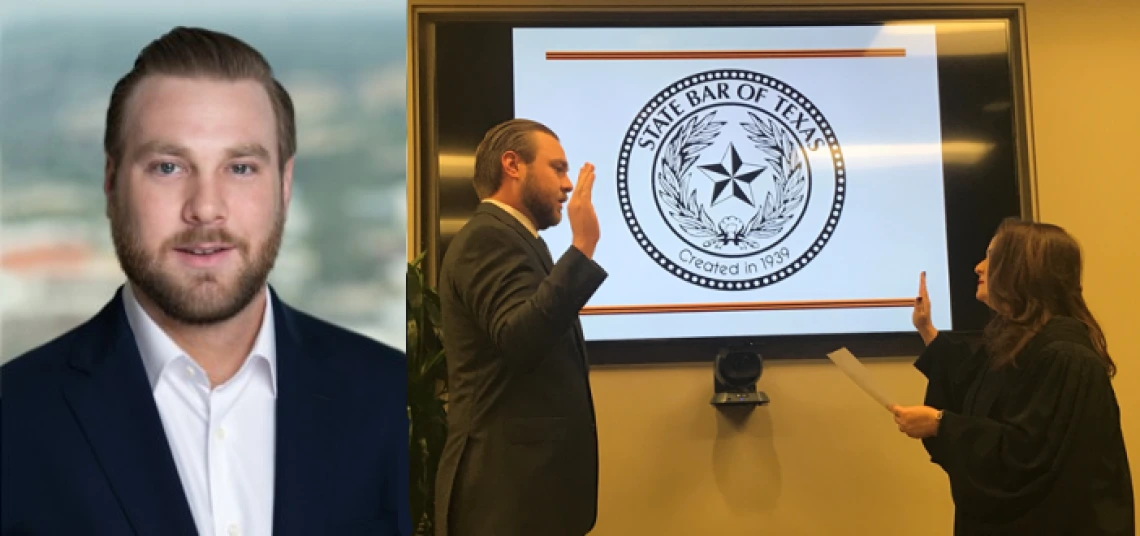Engineering Background Serves Attorney Alum Well
Graduate applies SIE expertise to the world of patent law.

SIE alum David Ashton now works as a patent attorney in Texas.
An engineering degree can open a wide world of possibilities.
David Ashton earned his bachelor’s degree in industrial engineering from the University of Arizona in 2013. He went on to concurrently earn a Master of Engineering and a Juris Doctor from Texas Tech University in 2017. After passing the Texas State Bar and the United States Patent Bar, he began working as an associate at Patterson and Sheridan LLP, a patent law firm in Texas.
Every day, he applies the problem-solving mindset he honed during his engineering education to helping his clients – many of whom are engineers themselves. He also serves on the National Academy Foundation boards of two Dallas-area high school engineering academies and the Dallas Bar Association Intellectual Property Section Young Lawyers Committee.
What drew you to studying engineering, and then law?
Growing up I was always interested in emerging technologies and have always been business minded. I learned about industrial engineering when I attended a scholars program about engineering disciplines between my junior and senior year. Everything really clicked when an attorney lectured about intellectual property law at my high school: A career in intellectual property law was the perfect pathway to unite my passions.
Why did you choose the University of Arizona for your undergraduate degree program?
The systems and industrial engineering program at the University of Arizona set forth a great pathway to learning to design and optimize complex systems, improve manufacturing processes, and acquire foundational engineering knowledge. In short, it looked like it would provide the foundation to becoming a critical thinker.
Did you work in the engineering field between receiving your engineering degree and attending law school?
I did not, because my plan was always to go straight onto earning my J.D. But I served as team lead on my senior capstone project, and that was the catalyst to my hands-on approach when working alongside clients. Our goal was to design a solution to reduce the impact of weather issues that disturb the data acquisition system used by our sponsor, Caterpillar Inc.
As the team leader, it was important to me that the project actually resulted in a design that could be used by Caterpillar. And it was: As soon as we finished it, Caterpillar implemented our design when testing their mining product line of heavy equipment. Our team also received the Raytheon Best Engineering Analysis Award.
Tell us a little bit about your job now.
My practice currently focuses on securing both domestic and international IP protection for businesses, such as semiconductor, engineered optics, display, and manufacturing companies. I’d say about a third of my day, I’m taking a deep dive into engineering concepts with inventors, another third I’m advising clients on the business and legal implications of cases, and the last third I’m doing thorough analysis on the legal aspects to make sure that we’re helping maximize the clients’ value. It’s been everything I expected, and I couldn’t be happier with my decision to go to the University of Arizona, or with my current career.
How do you use the skills you learned in your engineering education in your position as an attorney?
The knowledge I have acquired from my engineering education has been invaluable to my practice. I gained a broad expertise of technical knowledge, but the most important part of my education was learning how to apply that knowledge. No amount of technical expertise is the end for an intellectual property attorney. However, learning to think in a systematized, organized approach will always help you to be the best possible attorney, even as technology continues to change.
Do you have any advice for current engineering students, particularly those who may want to pursue fields outside of the discipline?
Yes. When learning a new concept, think about how the concept could be applied to your desired field. I would also recommend looking for ways to get involved in your discipline while you’re still attending university. Being involved in the Phi Alpha Delta law fraternity was helpful in making the transition to law school.
Patterson + Sheridan offers scholarships and internships to university students. Visit pattersonsheridan.com to learn more about their commitment to students and community involvement.

